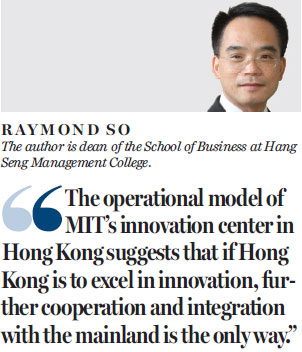Cooperation with the mainland is vital to successful innovation
Updated: 2016-06-16 08:02
By Raymond So(HK Edition)
|
|||||||
Modern economic development emphasizes innovation, and innovation is a major element of the future competitiveness of Hong Kong. For the SAR to compete in the global arena, we must make good progress in terms of innovation. Many people are skeptical about innovation because it implies the need to bear risks. However, it must be emphasized that innovation is not only about risk taking. Innovation can also mean modification of current approaches and products. Hence, scientific breakthroughs can lead to innovation, while improving existing practices is also about innovation. In fact, these two types of innovation are equally important for Hong Kong.
Many people think Hong Kong is weak when it comes to innovation. Those who hold this view believe Hong Kong does not have a strong research base. They tend to believe the SAR is better off focusing on its traditional economic pillars. It is safe to say that those who entertain such views do not really appreciate Hong Kong's past efforts and achievements. Take the now very popular DJI drones for example. The prototype of this flying machine was created by a student at a university in Hong Kong. But the inventor chose to establish his manufacturing base in Shenzhen because of the more favorable conditions there for startups. Another graduate of a Hong Kong university set up a venture in Zhuhai to produce stealth ships. From these two cases, we can see Hong Kong's capabilities in scientific research are not inferior to other places. However, Hong Kong is not as competitive as its neighboring cities in terms of hardware support.
The SAR has very competitive software requirements when it comes to innovation. In fact, the city is highly competitive in terms of having plenty of high-quality human resources. Moreover, the scientific research capabilities of universities in Hong Kong are outstanding. Universities in Hong Kong have an international reputation for scientific research. Many people in Hong Kong are mistaken in thinking the SAR's economy is driven solely by the financial and real estate sectors. The fact is Hong Kong has strong research capabilities. The question is how these research capabilities can lead to fruitful results that will help enhance Hong Kong's competitiveness.

Another example illustrates this point. The Massachusetts Institute of Technology (MIT), a leading university in the world, recently established an innovation center in Hong Kong. The first event organized by this innovation center is to have 24 US and Hong Kong students join teams in the city and have technology entrepreneurs experience a week in Shenzhen.
MIT would not choose a place for its innovation center if that place did not have any advantages in innovation. According to the director of MIT's innovation center, Hong Kong has advantages in four areas: (1) It is an international financial center; (2) it has a sound legal system; (3) it has a strong tertiary education sector; (4) it is close to Shenzhen and the Pearl River Delta. The first and second advantages are Hong Kong's inherent competitive advantages. A sound legal system will safeguard efforts in innovation; intellectual property rights will be protected by the rule of law. Meanwhile, availability of sufficient funds and venture capital is also essential for innovation.
The belief that Hong Kong has lagged behind other places in innovation is true in terms of hardware. Because of the high cost of land here, Hong Kong cannot compete with the mainland in terms of manufacturing costs. But innovation is a matter of creativity. The operational model of MIT's innovation center in Hong Kong suggests that if Hong Kong is to excel in innovation, further cooperation and integration with the mainland is the only way. The Pearl River Delta - specifically Shenzhen - will serve as a base for conducting the early stages of innovative work; Hong Kong will serve as a backstage. It will provide professional services to innovative activities and help protect the fruits of innovation. This cooperation will combine the strengths of both sides. In this sense, Hong Kong's competitive edges in terms of a sound legal system and financial prowess can play a similar role when it comes to innovation - as it did with traditional economic achievements.
Hence, I am optimistic about Hong Kong's future in regard to innovation. But, as mentioned above, the premise is that greater integration with the mainland will have to be achieved. This is because the two sides are complementary in their strengths. However, this is exactly where future challenges lie. After all, it is not only economic considerations which are involved; many future controversies may also arise.